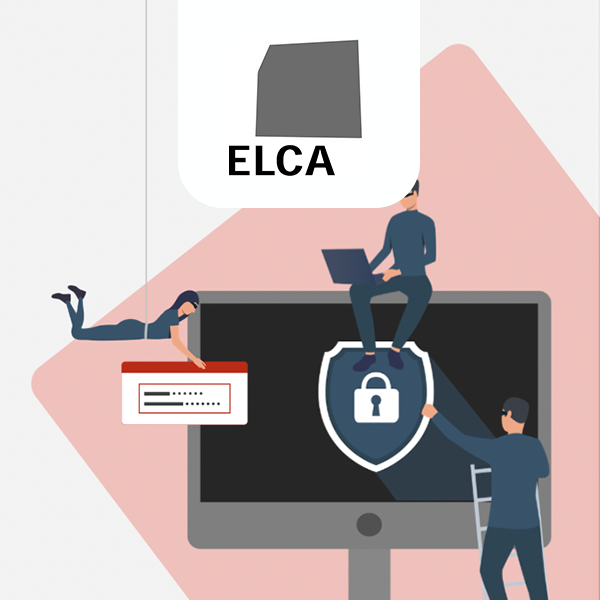


GICHD
In a context of increasing armed conflicts, securing areas contaminated by anti-personnel mines and other explosive ordnance is a major challenge.
The GICHD (Geneva International Centre for Humanitarian Demining) works alongside mine action stakeholders worldwide by providing expertise, training, and standards to enhance the effectiveness and safety of operations aimed at addressing explosive remnants of war.

As part of its mission, the GICHD has been offering training for humanitarian demining professionals for several years. Participants operating in conflict or post-conflict areas must master the best methods for identifying and neutralizing explosive ordnance to protect local populations.
Initially delivered in person, this training has evolved with the integration of an e-learning component designed and developed by eSkills, focusing on the fundamentals of technical survey preceding clearance operations. These e-learning modules prepare participants before attending a practical training session in Switzerland.
The main challenge was to translate a technical training program into an engaging digital learning experience for demining that remains true to real field conditions.
The challenges are numerous:
Integrating realistic visual content to immerse learners in environments similar to their operational contexts.
Ensuring a seamless connection between theoretical aspects and practical application.
Developing an interactive learning experience with activities that reinforce knowledge retention.
With this in mind, eSkills designed an e-learning training program structured into five 20-minute modules, focusing on the key stages of the land release process.
The training covers the key aspects of technical survey, which precedes all clearance operations.
Technical survey assets
Manual or mechanical asset ? Using mine detection dogs or rats? Depending on the type of explosive ordnance and terrain characteristics, detection strategies vary. This module guides participants in identifying the most suitable methods according to context while highlighting their advantages and limitations.


Threat and Terrain Assessment
Understanding the nature of the threat (types of explosive ordnance, dispersion patterns, risk density, etc.) and analysing terrain specifics (soil type, topography, environmental constraints, etc.) are crucial steps in adjusting clearance strategies. Through interactive scenarios inspired by real cases, this module challenges learners with real-world dilemmas.
Two approaches to technical surveys
Should we opt for systematic demining (line by line) or a targeted approach based on the incidents identified? This capsule explains the two methodologies and how they can be applied, through interactive exercises simulating field operations.


Key principles of technical surveys
How can we guarantee the safety and efficiency of our work? This capsule summarises the best practices to follow, illustrated by examples from the field.
Cluster Munition Clearance
Cluster munitions require a specific approach. Learners are introduced to color-coded mapping, a key tool for organising and prioritising land release operations. An interactive exercise allows them to practice mapping suspected hazardous areas.

To optimise learning, we have integrated a variety of teaching methods:




Thanks to its short and dynamic digital format, this training enables participants to prepare for demining techniques effectively in advance and at their own pace. It has replaced an in-person session, freeing up time for more practical exercises in Switzerland (equipment handling, intervention simulations, etc.).
This project strengthens the collaboration between eSkills and the GICHD and contributes to enhancing the safety of local populations.
To see our other work for the GICHD on raising awareness of the risks associated with explosive ordnance (EORE).

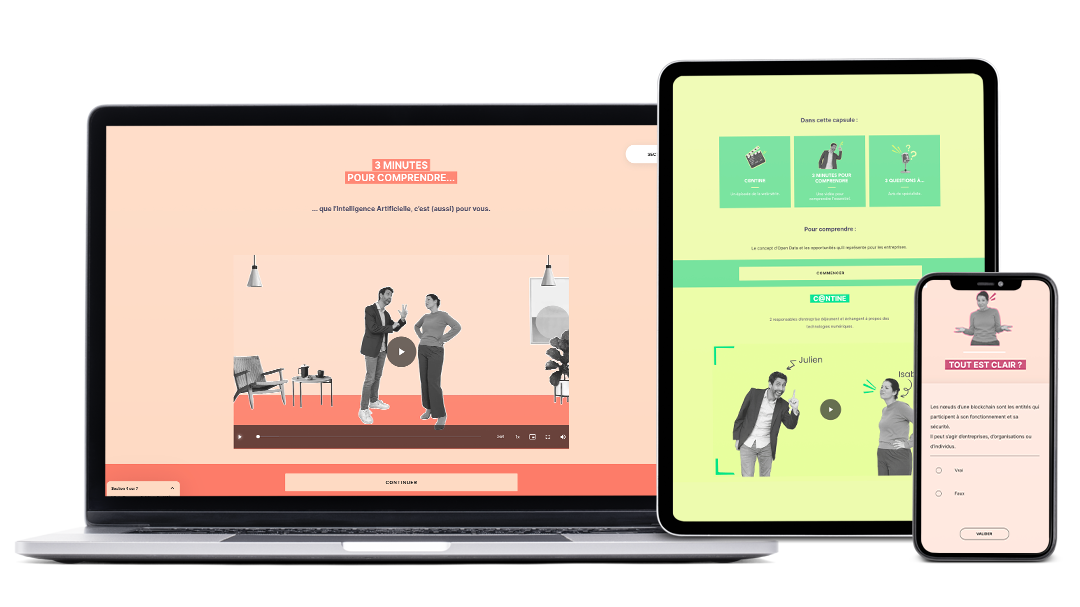
Cantonal Office for Economy and Innovation (OCEI)
Geneva SMEs face a major challenge: integrating new technologies to stay competitive. Artificial intelligence, blockchain, cybersecurity, open data—these are all essential concepts, yet they are often seen as complex. That’s why the Cantonal Office for Economy and Innovation (OCEI) has launched a series of free and accessible MOOCs designed to help businesses navigate this transition with ease and efficiency.
Traditional training programs are often perceived as lengthy and overly technical, making it difficult to engage business leaders. It was therefore crucial to rethink the format—making it more innovative, dynamic, and tailored to the constraints of entrepreneurs, with fast, practical learning that can be applied immediately.
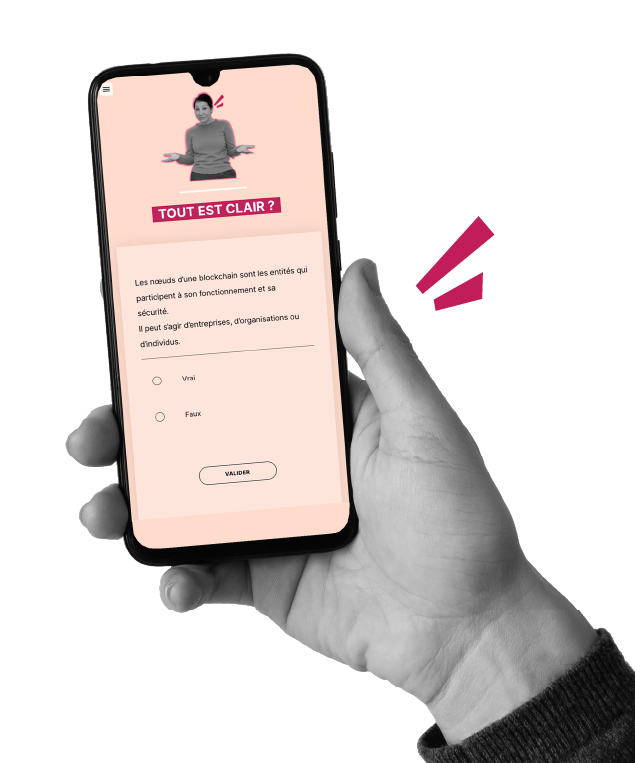
Let’s start with course development. The goal is to create content closely aligned with real-world business needs and offer training that is immediately applicable. To achieve this, we interviewed both academics and entrepreneurs—blending theory with a strong emphasis on practice—to understand how these new technologies can bring value to businesses in their daily operations.
For the format, we chose an original approach:
Each topic is divided into three episodes of approximately 7 minutes—quick to go through, with varied and engaging content to keep the pace dynamic.
Each episode kicks off with a lively, humorous scene featuring our talented actor partners from La Compagnie des Arts.
The topics are presented in a lighthearted and engaging tone to make even the most complex concepts easy to grasp! For example, blockchain is explained through an analogy with a chocolate bar.
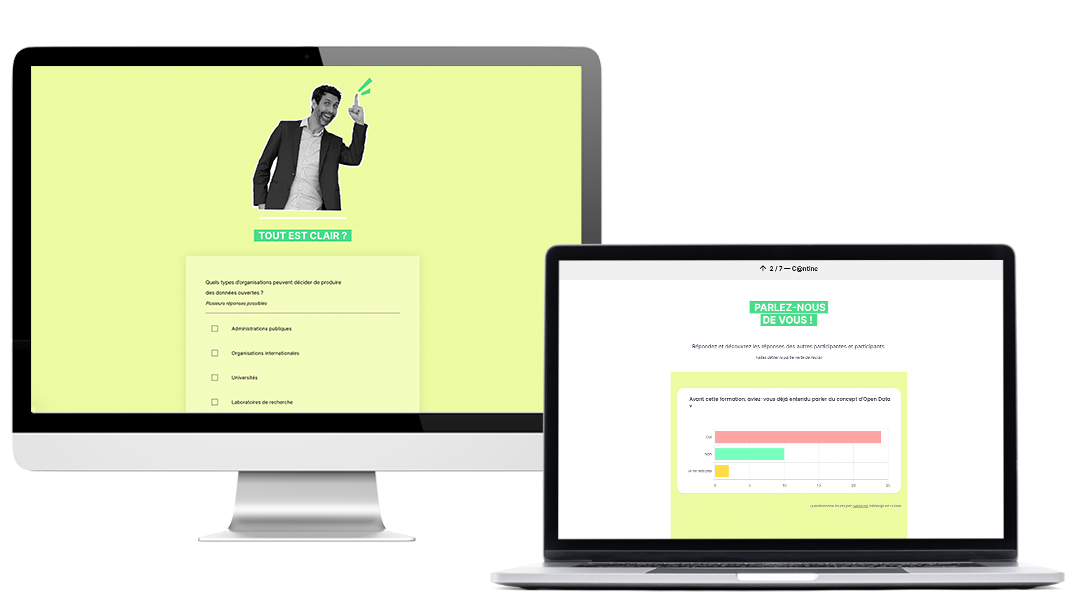
The pace is dynamic, and the learning methods are diverse: polls, quizzes, animated videos, expert interviews, and practical guides all work together to reinforce knowledge retention.
Finally, access is completely free and requires no registration. With just one click on the OCEI website, users can start their training immediately.
No commitments, no constraints—the modules are available anytime, allowing business leaders and their teams to learn at their own pace, whenever it suits them.
Since its launch, the program has been a great success among Geneva SMEs.
📩 Widespread Impact via OCEI Newsletters – 8 campaigns sent to 9,000 subscribers, with open rates of up to 24%, demonstrating strong interest in the training.
📊 High Visibility on Social Media – Over 7,600 views and 1,500 clicks generated.
📈 A Scalable and Sustainable Solution – The modules continue to be enriched and shared, ensuring long-term support for businesses.
Through this initiative, OCEI offers an innovative digital training program that equips SMEs with essential skills to successfully navigate their digital transition.
Whether you’re an SME leader, an IT manager, or simply curious about the opportunities of digital transformation, these MOOCs will provide you with practical insights to take action. Don’t miss this opportunity!
Start Learning Now and Stay Ahead in the Digital Transition.
Explore our MOOCs here (in French):
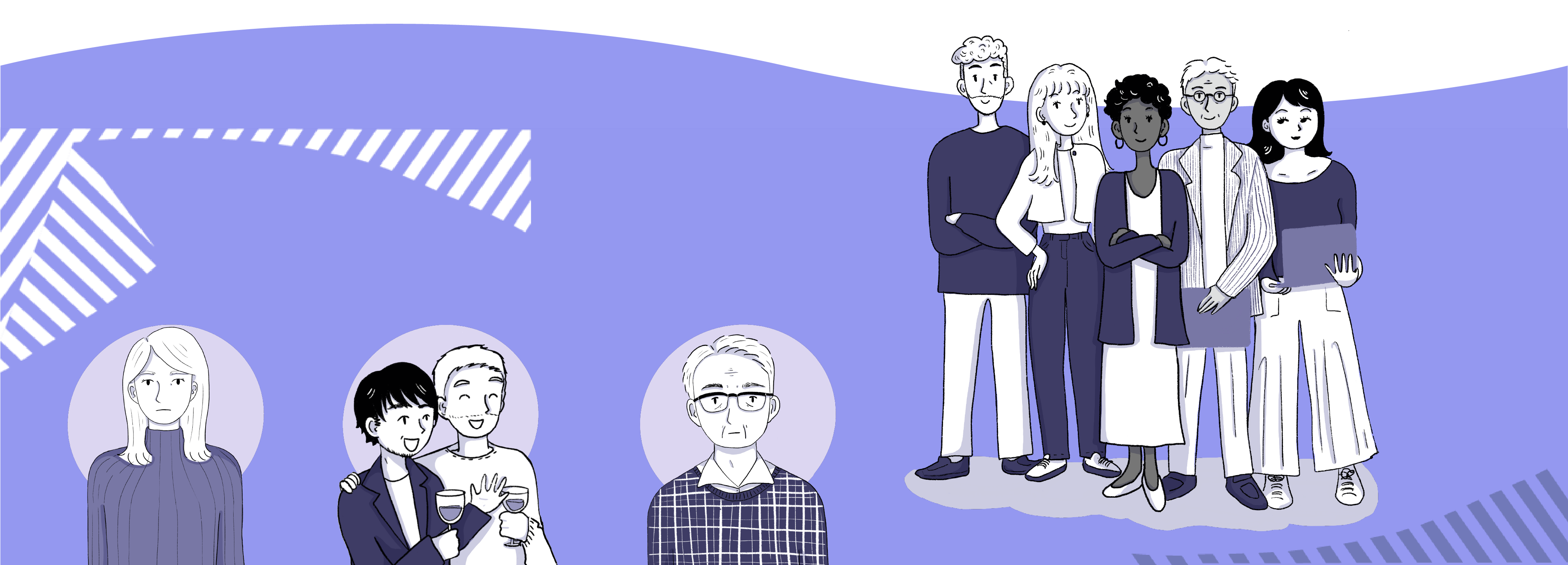
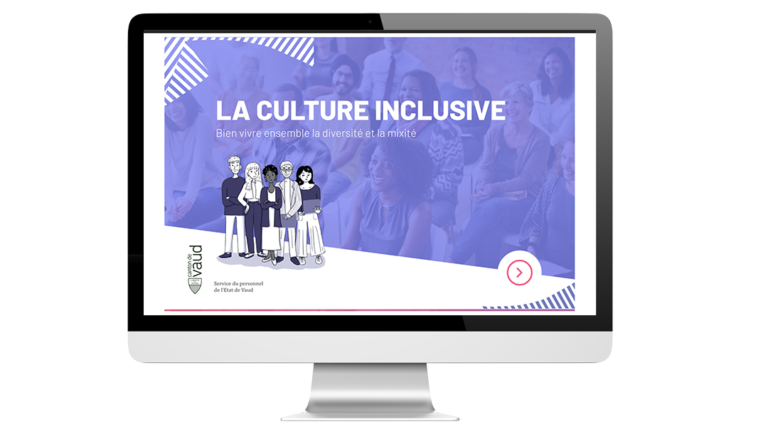
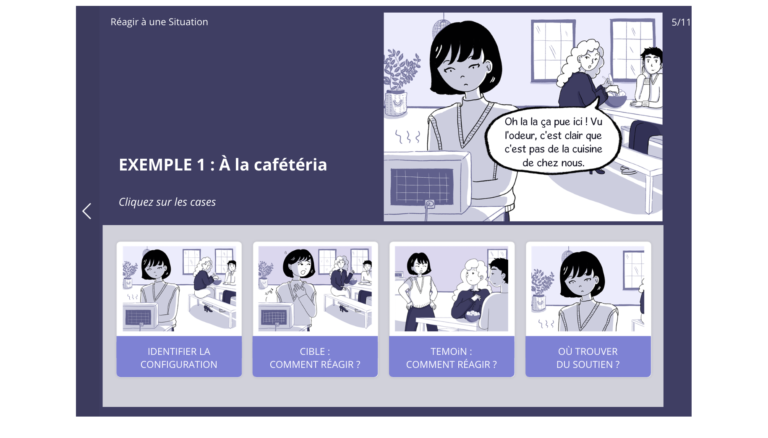
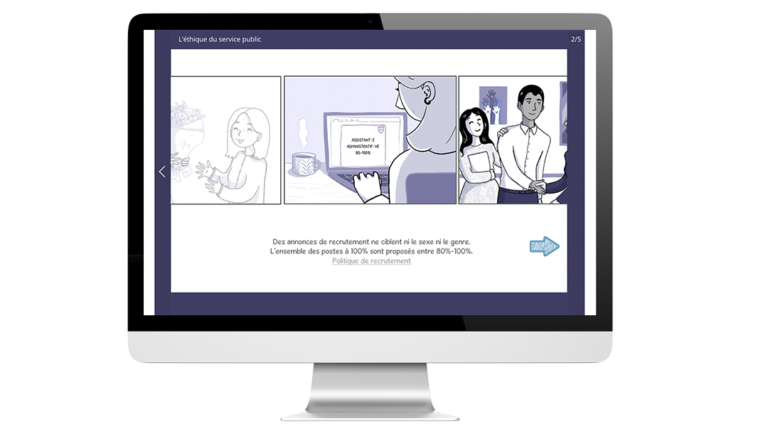
In the face of demographic change and heightened social and political awareness, building an inclusive culture is no longer just a ‘good to know’, but an essential strategy for developing the employee experience and employer identity.
In order to reinforce an inclusive corporate culture in the State of Vaud, a tailor-made module has been made available to all employees of the administration.
Examples inspired by real-life situations, between colleagues or during interactions with citizens, allow for a better understanding of situations in a positive way by affirming diversity and inclusion.
Several role-playing scenarios raise awareness of common stereotypes related to race, gender and cultural identity.

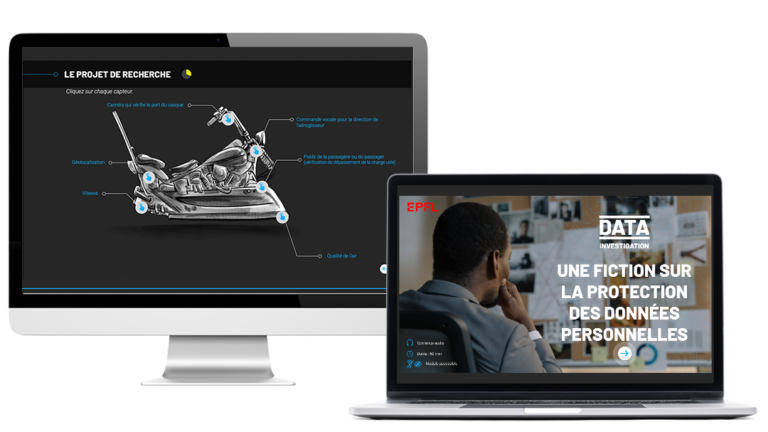
The training on the new Federal Act on Data Protection (nFADP) covers the protection of personal and sensitive personal data within an academic institution and research activities. It helps strengthen the institution’s culture regarding data processing and cybersecurity.

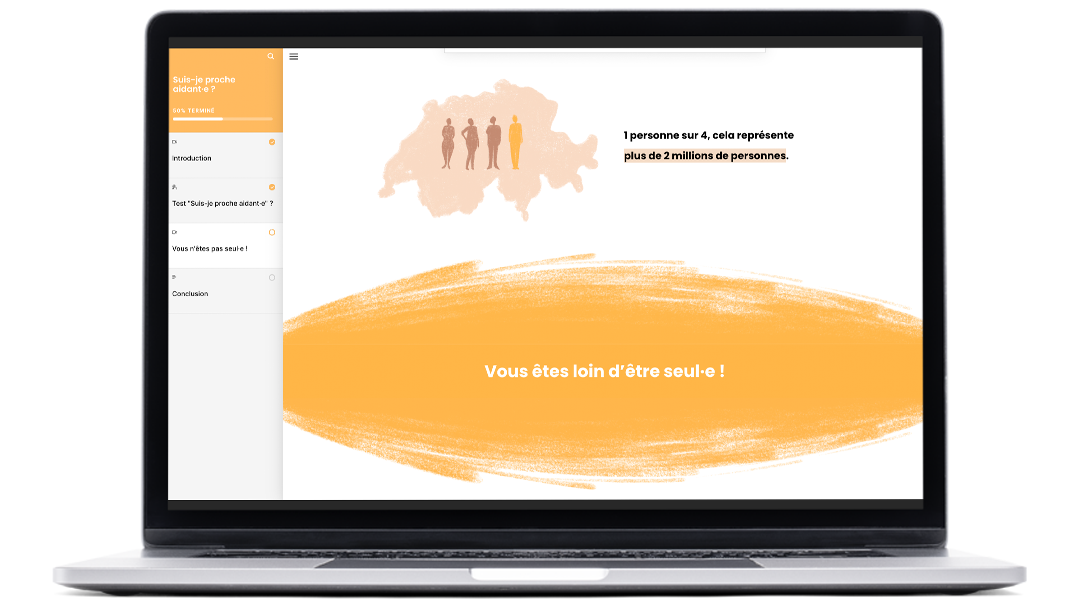
État de Genève
Saviez-vous que l’on compte 2 millions de proches-aidants en Suisse ? Cela signifie qu’actuellement 1 personne sur 4 est proche aidante
Or, de nombreux proches-aidants n’en ont pas conscience et ignorent qu’ils peuvent être accompagnés et soutenus.
L’État de Genève a lancé plusieurs initiatives pour permettre aux proches aidants de prendre conscience de leur situation et de les informer des aides dont ils peuvent bénéficier pour les soutenir dans leur quotidien.
En effet, de nombreuses personnes continuent d’accomplir leurs tâches quotidiennes (travail, famille, etc.) tout en s’occupant régulièrement d’un proche et le cumul peut devenir une source d’épuisement.
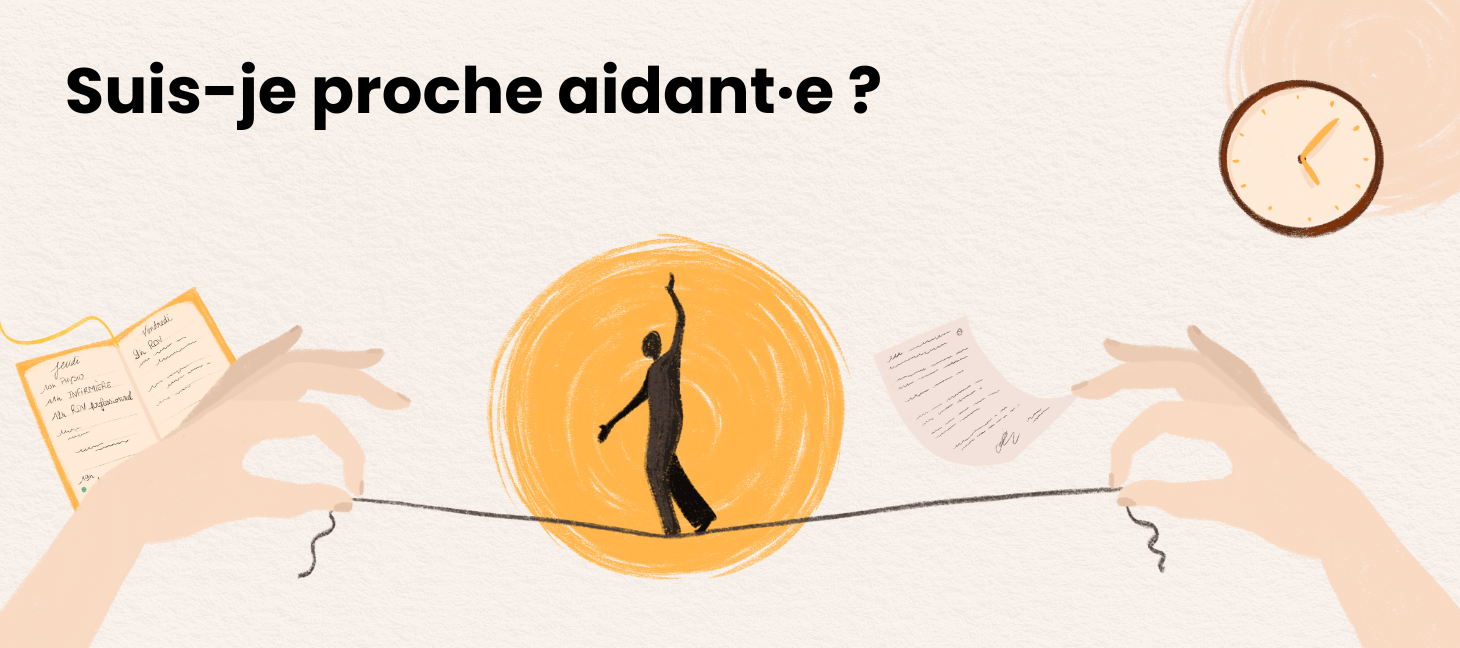
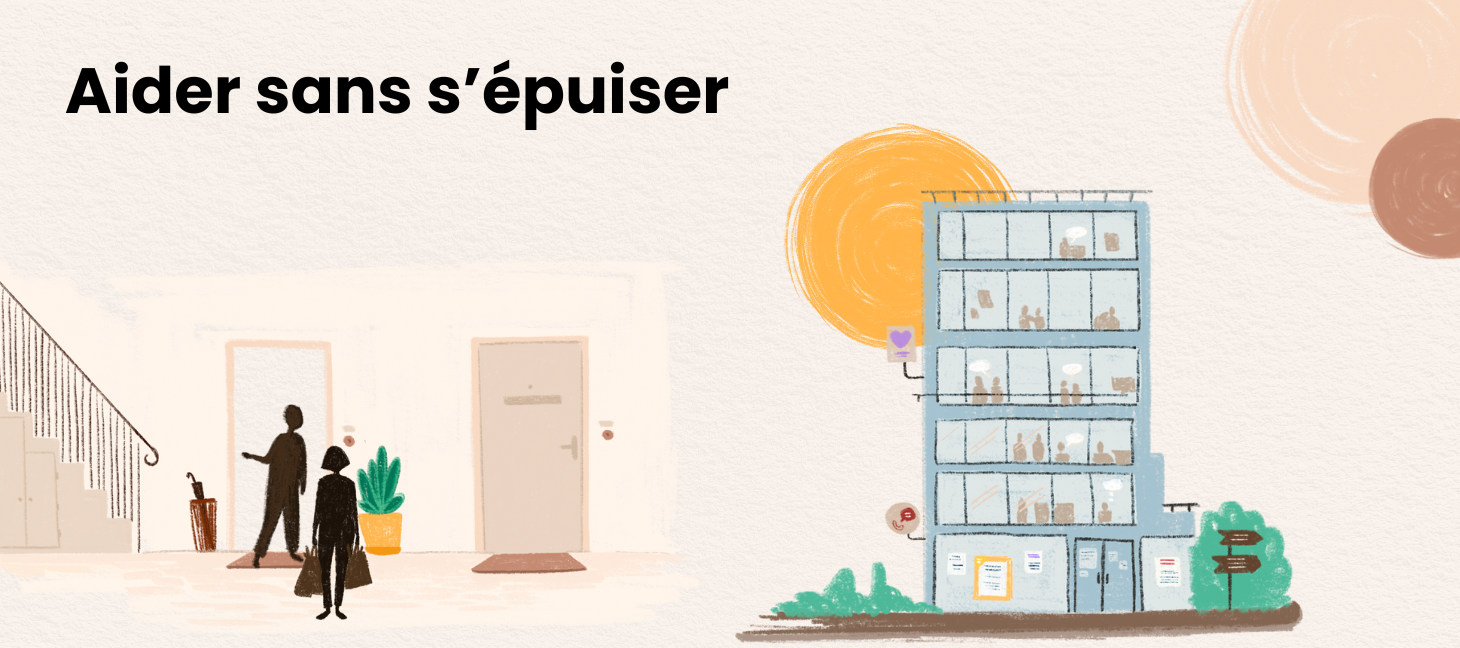
Le brief était de réaliser des capsules digitales qui ne soient pas uniquement informatives. Afin que les personnes concernées puissent facilement se plonger dans le sujet – même dans un certain état de fatigue – le but était que les modules offrent un moment agréable et léger.
Pour répondre au mieux à ce projet qui véhicule bienveillance, empathie et partage, notre équipe a commencé par la définition de personas. Cette réflexion s’est imposée comme une étape clé pour bien comprendre les différentes situations, prendre conscience du vécu émotionnel des proches-aidants et mesurer les conséquences que cela pouvait avoir dans la vie quotidienne de chacun.
Bastien et Laurie ont alors mobilisé toute leur créativité et leur poésie pour créer un podcast d’un nouveau genre : le podcast illustré “Entre nous”. Une voix-off posée sur de jolies animations raconte l’histoire du proche aidant de Dominique – dont on ignore les détails sur son lien avec son proche-aidant et sur sa maladie – afin que chacun soit libre de se reconnaître. Au fil des épisodes, on peut suivre le personnage principal dans son quotidien, rythmé par des moments de découragement, des interrogations, des phases de fatigue et à travers le regard d’une amie, Nathalie.
Nous avons imaginé la série dans une ambiance très « cocooning », poétique par moments, qui se veut rassurante, pédagogique et chaleureuse.
Entre les différents épisodes de la série, l’utilisateur peut explorer différentes situations de proches aidants avec des témoignages. Il est également invité à réaliser un test afin de prendre conscience de sa situation et à écouter des interviews d’intervenants pour le sensibiliser et lui donner envie de solliciter de l’aide.
Tout a été pensé pour que le proche aidant se sente en confiance et prenne conscience qu’il n’est pas seul et qu’il peut bénéficier de soutien.
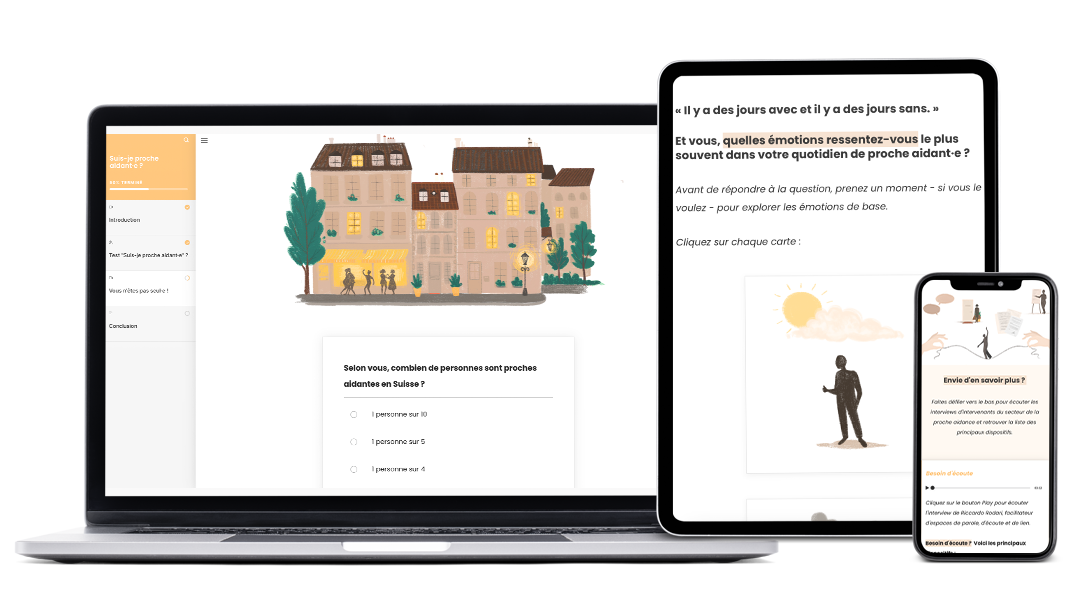


STATE OF GENEVA
In Geneva’s administrative offices, the days of office bins and wastepaper baskets are numbered! And not by chance! The State of Geneva has set itself the target of increasing the proportion of waste recycled from the current 30% to 80% by 2025. So no more wastepaper bins, which admittedly contain little more than paper, and hello new sorting points!

DIGITAL TRAINING FOR THE STATE OF GENEVA
To help change habits, so that everyone can familiarise themselves with the new sorting points and avoid putting their rubbish in the wrong bin, the State of Geneva asked eSkills to create a short, interactive digital training course to help people quickly understand how to sort waste effortlessly and become true Serial Sorters! The aim of the training is to make the sorting process accessible to everyone, so that the 80% recycling target can be achieved.
The module produced by eSkills is designed to raise awareness of sorting and to help manage change, particularly in the face of resistance and misunderstanding: “Why is my rubbish bin being taken away from under my desk? Why do I have to get up to the sorting point in the corridor? Which bin should I put my coffee cup in?
LET'S SORT IT OUT: THE NEW CUSTOMISED E-LEARNING MODULE
Before embarking on the production of the digital learning module, the eSkills team began by analysing the various obstacles to the approach, such as the fact of having to get up to the sorting point or the belief that waste is not actually sorted.
Our team chose to produce a narrative film with a humorous tone, using photocollage videos in which actors play two office workers: one with a more advanced level of environmental awareness and the other who is rather sceptical at first, but who eventually becomes aware of his impact on the environment.
Gamification was integrated to make the digital training module fun, with 2 mini-games “Serial trieur” and “Very Bad Tri”, which involve “drag and drop” to put a series of items of waste in the right containers and identify errors in the bins.
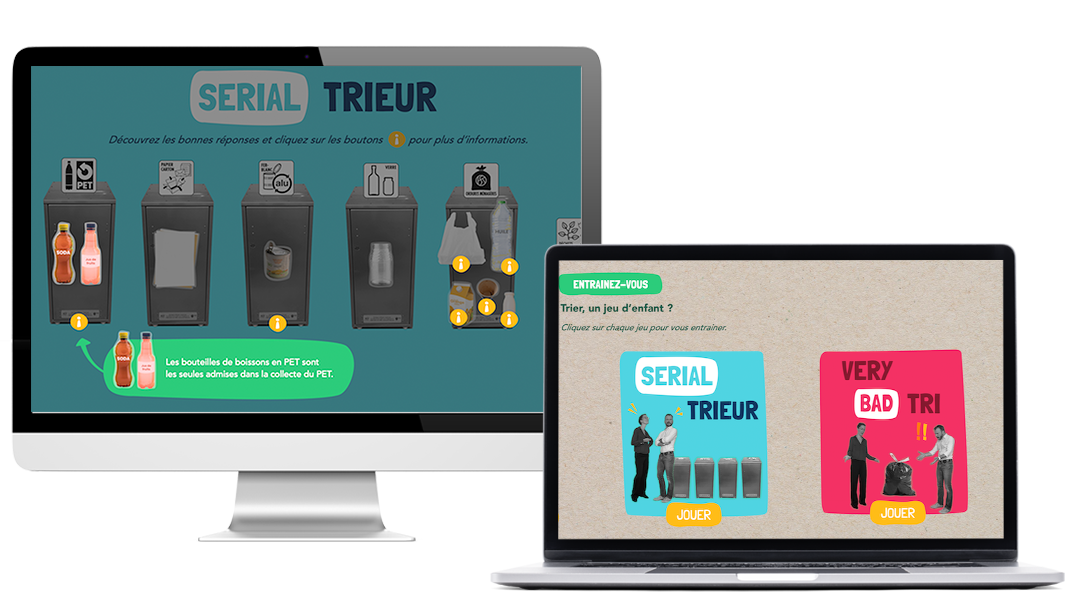
To find out more about raising awareness online :
While the training module raises awareness of sorting, at the end of the course it also looks at how to reduce waste by using alternatives (a water bottle rather than a plastic water bottle, a cup rather than a disposable cup, etc.) and raising awareness of the fact that recycling is all very well, but the best waste is the waste that doesn’t exist!


The Musée d’ethnographie de Genève (MEG) has been awarded the THQSE international label (Very High Social-Social-Health and Environmental Quality) at the highest level of excellence. This makes it the first museum in Europe to be awarded the THQSE label! This label certifies more than 15 years of social, societal, economic and environmental actions carried out by the museum. A great reward!
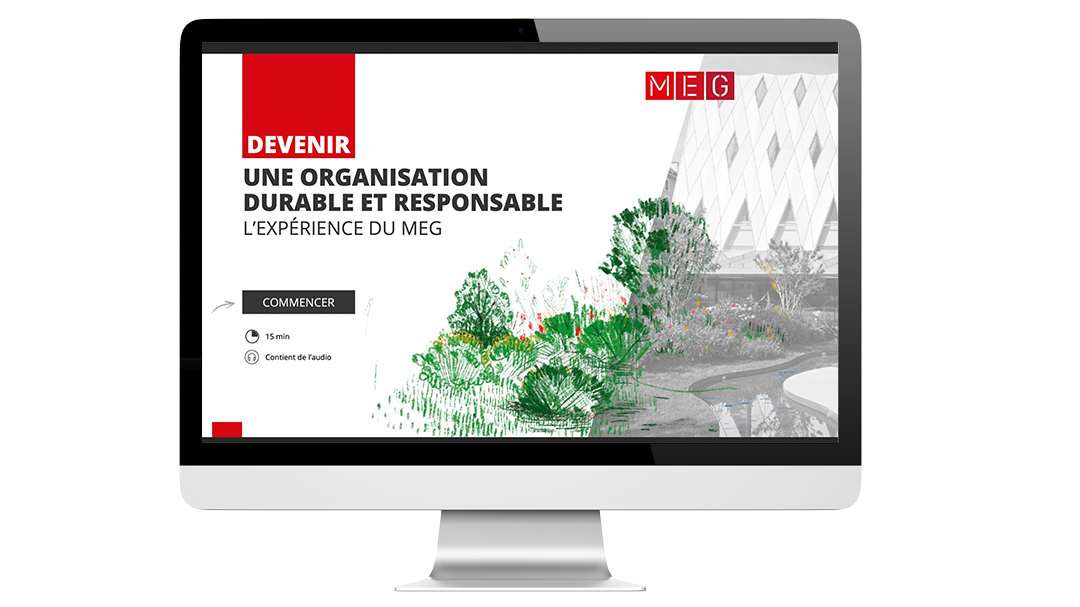
Since the MEG obtained this label, it has been much in demand from other cultural institutions (museums, theatres, etc.), which would also like to follow this path towards greater sustainability and also obtain the THQSE label. MEG receives many requests for information about its approach, which are pertinent but often repetitive.
In order to respond to each of these requests and to encourage other cultural institutions to follow its lead, MEG has come up with the idea of distributing explanatory material to institutions that request it, answering the questions that are most frequently asked.
Are you starting to see what we’re getting at?
As you may have gathered, this is where eSkills comes in, armed with its e-learning training skills.
MEG’s brief was very clear: it was all about sharing experience. The idea was to create a digital training module that would be both pedagogical and informative, to share the approach that had been implemented so that cultural organizations could benefit from the lessons learnt: how to tackle the task, examples to follow, good practices, and so on.
No sooner said than done, the eSkills team set to work to imagine a digital medium offering clear answers, with an intuitive and fun user interface. To achieve this, we started with 4 key questions that were frequently asked, to which we provide answers with key information following a logical flow. The navigation is designed to be intuitive, guiding the user to the various key milestones. For the design, we’ve stayed in tune with the world of culture, with pretty illustrations that are 100% made in eSkills, with poetic overtones, to help visualise the different stages in answering the questions.
As a bonus, we’ve included audio statements from Carine Ayélé Durand, director of the MEG, which adds a truly immersive dimension, ideal for getting to the heart of the responsible and sustainable approach.
The module is fairly short and can be shared easily ( no more attachments, which are far too heavy to send by email). The idea was to give cultural institutions all the keys they need to start a sustainable and responsible approach, by getting straight to the heart of the matter.

From now on, MEG can distribute this interactive content as soon as they are approached on the subject. Note that the module will be translated into English to widen its distribution and involve more institutions in the approach and perhaps towards obtaining the THQSE label!
Have you got an e-learning training project or do you need a customized digital learning module?


Do you know OPAGE? It’s the Office de Promotion des Produits Agricoles de Genève, which has been working since 1995 to promote agricultural products from the canton of Geneva! You may not know it, but Geneva is not just home to banks and watches. The canton is also a veritable agricultural land.
But Geneva’s producers face stiff competition from foreign producers, and they also come up against certain prejudices that are firmly entrenched in the minds of the canton’s consumers… And yet, eating locally has many virtues. In particular, it reduces the carbon footprint associated with imports.

THE OPAGE BRIEF
How can we promote Geneva’s agricultural practices and explain the benefits of eating locally?
The OPAGE has asked eSkills to design and produce a series of educational, offbeat videos for broadcast on social networks. The aim of these videos is to deconstruct consumers’ preconceptions and explain the context so that everyone can make up their own minds. Are you wondering why OPAGE chose eSkills rather than a communications agency?
Quite simply because these videos have to be produced from an educational angle. Education is a powerful communication tool, and when combined with video, eSkills turns it into a super-powerful digital learning tool!
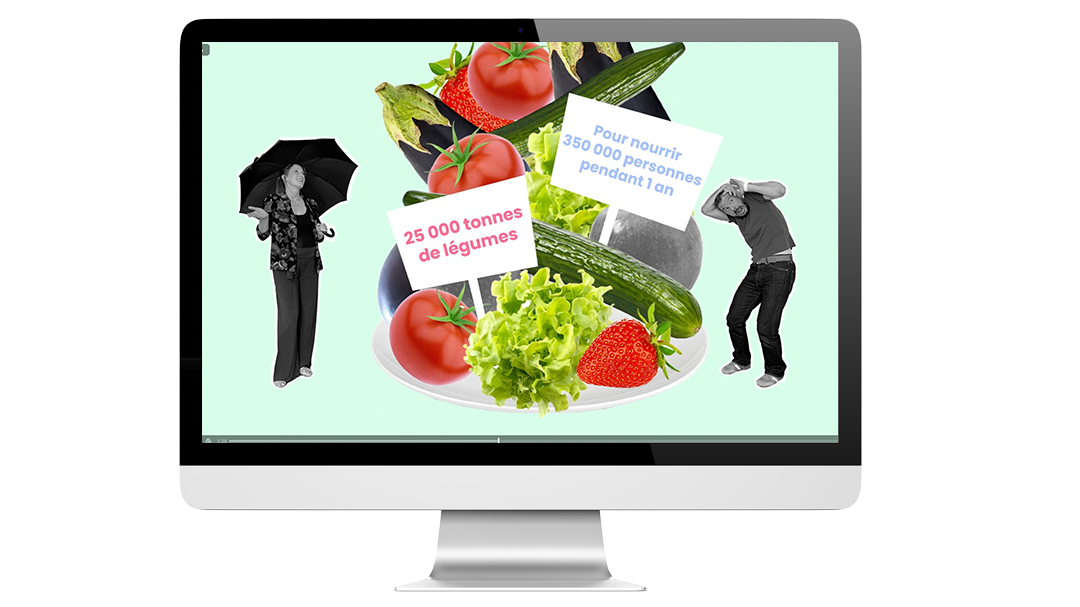
Pedagogy and digital learning: let me explain!
How do you root out consumer prejudices?
The eSkills team came up with the idea of a couple who represent Geneva consumers. In a humorous tone, the man embodies the most common preconceived ideas, while the woman deconstructs them using concrete facts and clear explanations.
Each episode has the same structure with the same couple (thanks to comedians Marie Bétrisey and Sarkis Ohanessian) and also features a different expert depending on the theme of the episode (producer, government representative, restaurateur etc.)… This person answers technical questions or shares his or her practical experience on the subject.
To see what happens (and learn all about growing cardoon in Geneva), we’re sharing our favourite episode with you. And if, after watching this episode, you feel like eating some thorny silver cardoons from Plainpalais, then we’ve won our bet!
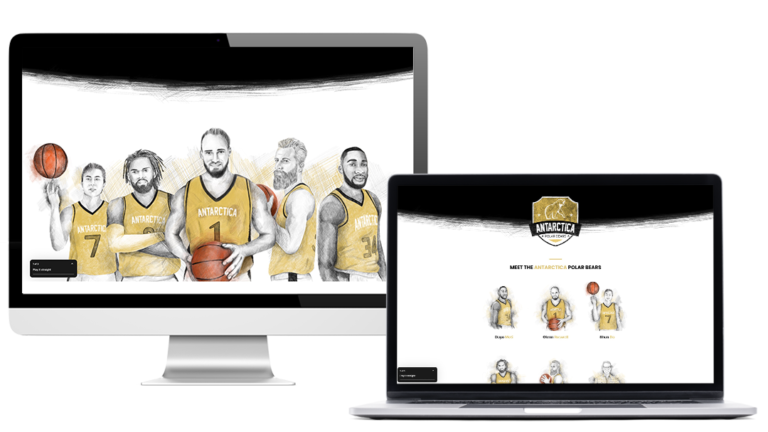
E-LEARNING - BASKETBALL ETHICS QUIZ
Have you heard of FIBA? It’s the International Basketball Federation, in other words, the body that oversees basketball worldwide. It brings together no fewer than 212 national federations. That’s a lot! FIBA’s role is to establish the sport’s official rules and organize international sporting events such as the World Basketball Championships.
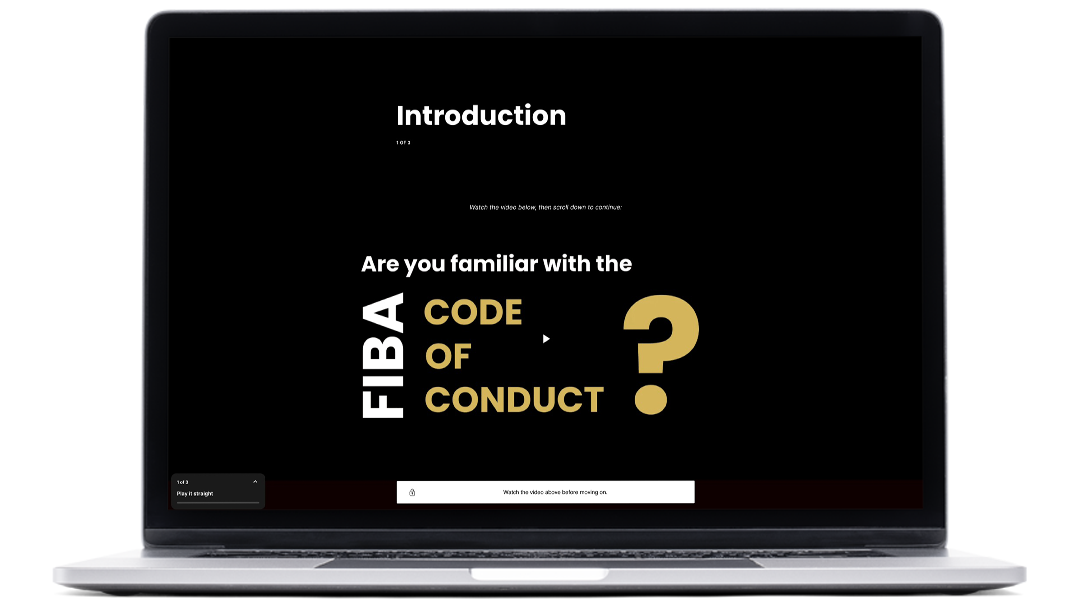
THE FIBA BRIEF
If we’re telling you all this, it’s because FIBA approached eSkills for the World Basketball Championship, which was won by Germany in September 2023. Of course, the reason FIBA approached us was not because of our sporting achievements (although we would defend ourselves…), but rather because of our digital learning talents.
And here’s the brief: to design a digital module aimed at reminding the players of the various teams in the championship of the rules of ethics in sport.
The aim was to create a short e-learning capsule to raise players’ awareness of the FIBA code of conduct. The challenge was above all to get them involved, not to bore them! It has to be said that international players have a lot of other things on their minds… And yet, respecting the rules is important.
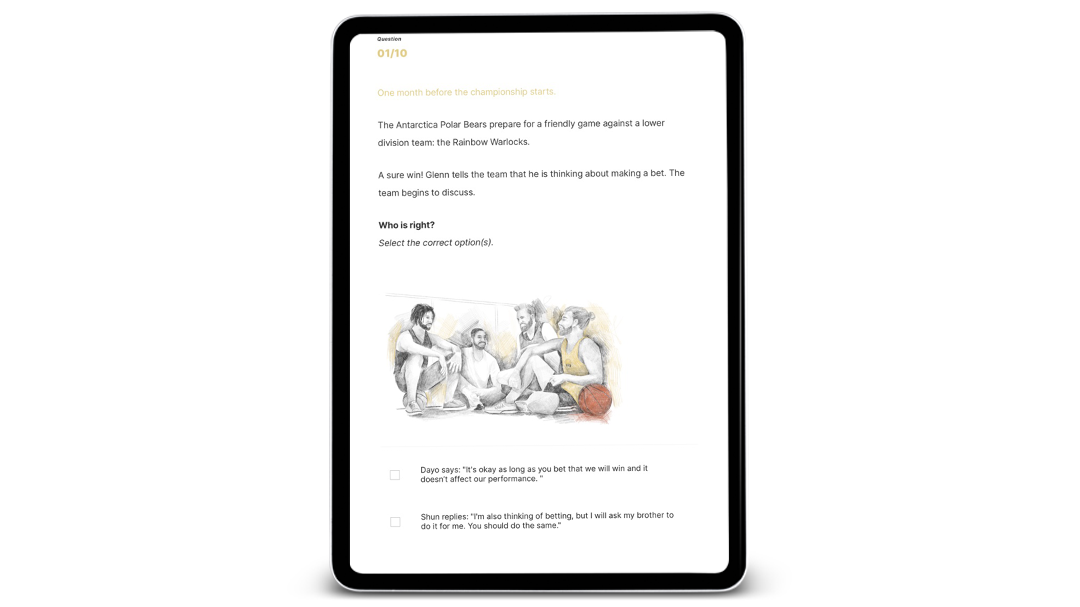
IT'S ON!
The course includes several themes to tackle, such as corruption, harassment, humiliation, intimidation, racism, discrimination and fair play, all in a fun and interactive way.
A challenge, sport and values – that’s all it took to stimulate the eSkills team’s creative fever and get their adrenalin pumping! The team set to work designing a module representing 10 situations encountered by a fictitious team “the 𝐴𝑛𝑡𝑎𝑟𝑡𝑖𝑐𝑎 𝑃𝑜𝑙𝑎𝑟 𝐵𝑒𝑎𝑟𝑠”, illustrated by us of course!
eSkills has designed a fun, interactive and illustrated digital training module capable of holding players’ attention for 10 minutes. Phew! The content is in English, and the framework is based on a quiz that everyone is invited to answer.
During the course, the players were confronted with concrete examples of delicate situations likely to occur in the world of high-level basketball. There is a scene involving an exchange of text messages between a player and the assistant in charge of team logistics. Using the e-learning module, eSkills analyses the behaviors and words used in the exchange to determine whether they are appropriate.
To ensure that all the information is fully assimilated, the module closes with a summary of the rules contained in the module.
LOOKING FURTHER AFIELD
The story doesn’t end there. Now that the e-learning module has been produced and has proved its worth, the idea is for it to live on, being distributed to national federations, as well as basketball clubs, to continue to raise awareness among all those who play the sport.
To this end, the module has been translated into French, Spanish, Portuguese and Mandarin. A virtuous circle to which we are delighted to have contributed. Enough to make the team (almost) want to take up basketball!
Besoin d’une formation digitale sur-mesure ?

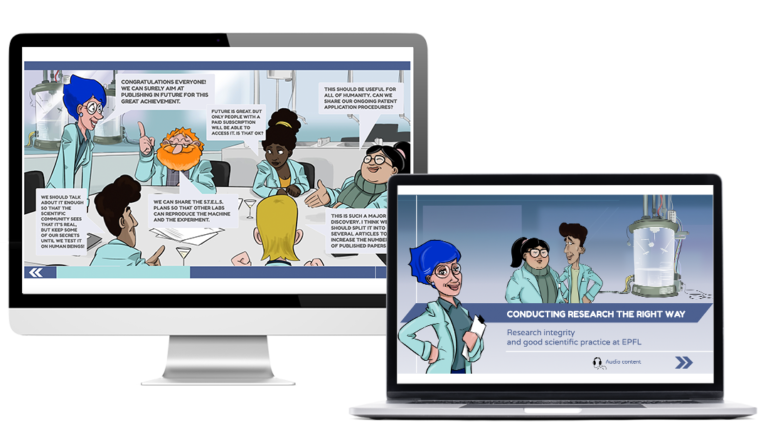
EPFL entrusted us with the development of various e-learning projects.
The Integrity in Scientific Research training focuses on best scientific practices to ensure high standards in research and innovation management.


Every year, a large number of civilians are killed and injured by explosive ordnance. Explosive ordnance is one of the lasting consequences of armed conflict.
Our mission: develop a series of e-learning courses on the basic principles that frame the risks associated with explosive ordnance. The aim is to enable the adoption of best practice in the design/implementation of more effective and efficient EOD operations.
The course is aimed at mine action professionals as well as the general public who may have no prior knowledge of the subject. The content is accessible and inclusive, taking into account gender and accessibility for people with disabilities. A large number of audio testimonies illustrate actions and their impact on the ground.

“Finding and partnering with eSkills has been a tremendous privilege, and we could not be more pleased with the results.
We decided to hire eSkills because the company offers a wide range of services that covered the entire project’s design and development – from pedagogical and instructional design expertise, to sketch artists and video production. In addition, the team took our original concept and accompanied us through a highly professional and human / user focused process.
They approached their work with enthusiasm and urgency, listened to and translated our needs into the design and production, and did so in a cost-effective manner, and always with great flexibility, patience and genuine interest for the topic.”
Mathieu Laruelle, Explosive Ordnance Risk Education Advisor, GICHD

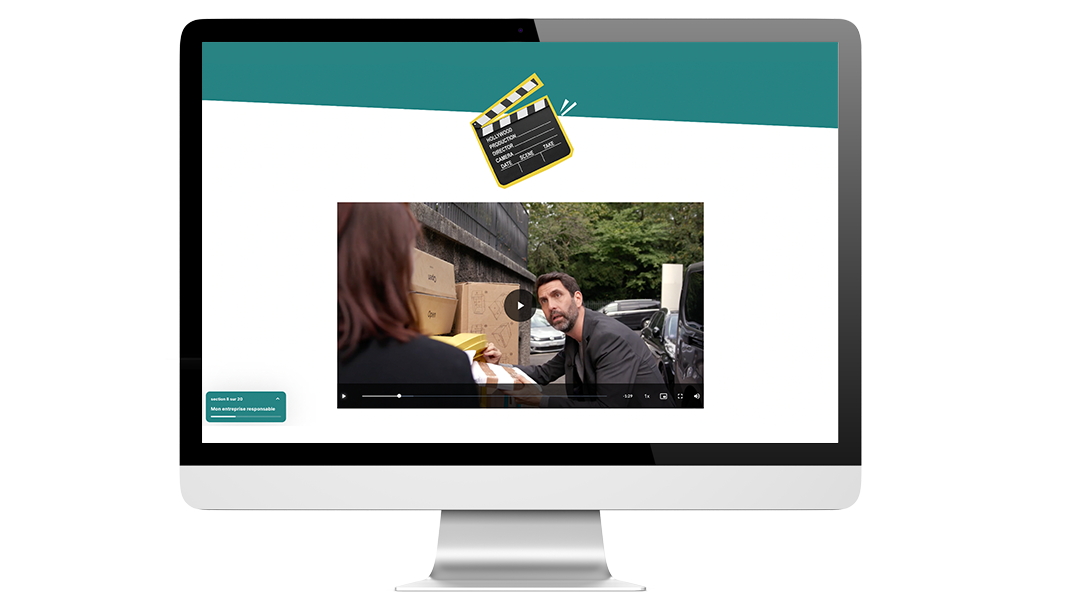
In 2022, the DGDERI has developed a support programme around Corporates Digital Responsibility (CDR)
In this context, eSkills has been commissioned to create an awareness module for entrepreneurs from small and medium-sized enterprises in the State of Geneva.
Objective: To raise the curiosity and interest of this audience in Digital Responsibility by presenting it not as a constraint but as a strategic opportunity.
We have therefore imagined an express and very fun course built around two fictitious entrepreneurs and their digital issues. Data protection, environmental impact, artificial intelligence, etc. the main subjects of CDR are tackled along the adventures of Paul and Lucie and through original formats: sketches, motion design, surveys, etc.
It was during this project that we created SwissPoll with our friends from Labster.io. A digital (and responsible) survey tool, completely swissmade, which does not collect any data on the respondents.
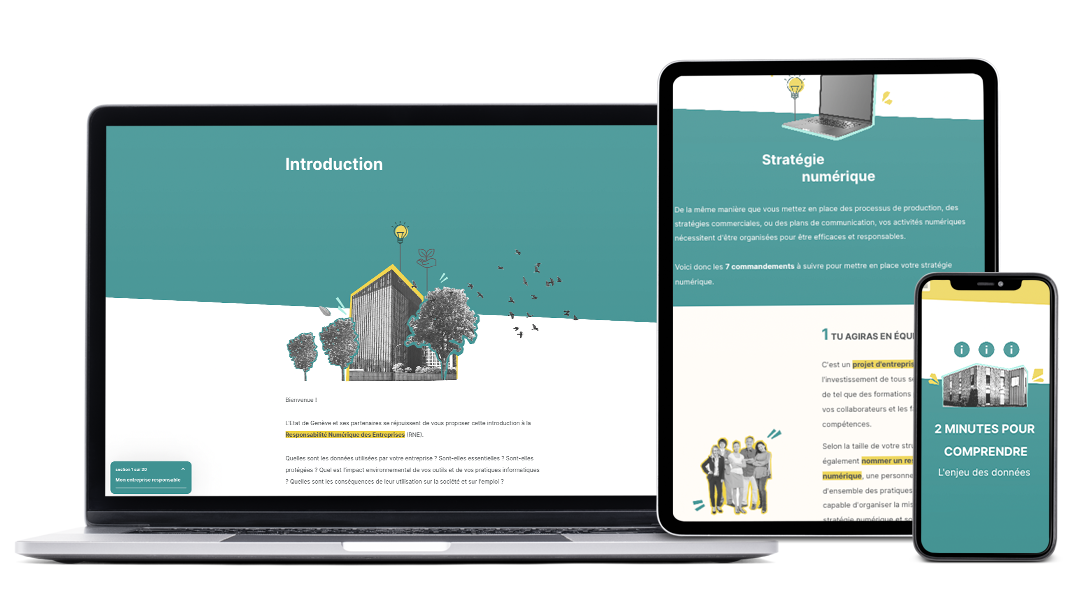
Adresse
23, rue des Eaux-Vives –
1207 Genève – Suisse
Téléphone
+41 22 700 12 01
Made with ❤️ in Switzerland🇨🇭
2023 © by eSkills • All rights reserved